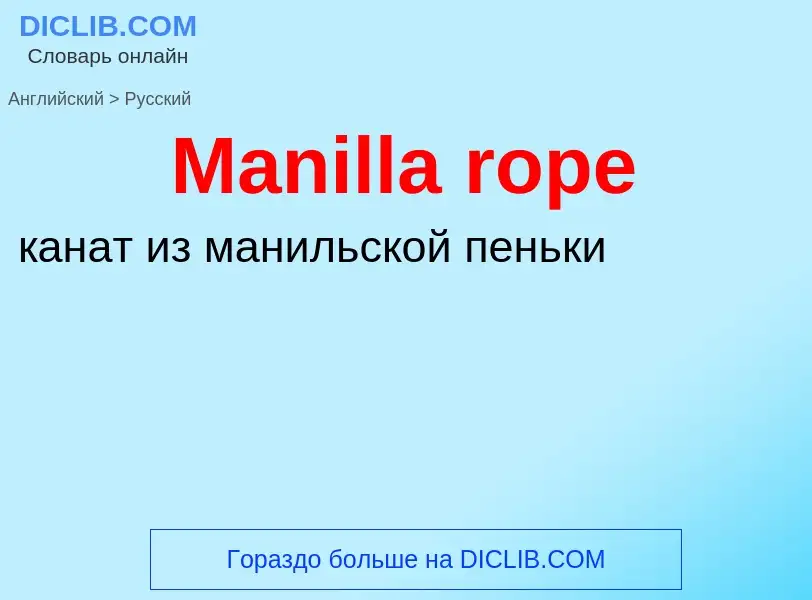Перевод и анализ слов искусственным интеллектом ChatGPT
На этой странице Вы можете получить подробный анализ слова или словосочетания, произведенный с помощью лучшей на сегодняшний день технологии искусственного интеллекта:
- как употребляется слово
- частота употребления
- используется оно чаще в устной или письменной речи
- варианты перевода слова
- примеры употребления (несколько фраз с переводом)
- этимология
manilla rope - перевод на русский
нефтегазовая промышленность
пеньковый канат
строительное дело
канат из манильской пеньки
[æbə'kɑ:]
строительное дело
манильская пенька
существительное
общая лексика
абака
манила
манильская пенька
абака, манильская пенька
['dʒʌmprəup]
общая лексика
скакалка
прыгалка
Определение
Википедия

Abacá ( ah-bə-KAH; Filipino: Abaka [ɐbɐˈka]), binomial name Musa textilis, is a species of banana native to the Philippines, grown as a commercial crop in the Philippines, Ecuador, and Costa Rica. The plant, also known as Manila hemp, has great economic importance, being harvested for its fiber, also called Manila hemp, extracted from the leaf-stems. Abacá is also the traditional source of lustrous fiber hand-loomed into various indigenous textiles in the Philippines like t'nalak, as well as colonial-era sheer luxury fabrics known as nipís. They are also the source of fibers for sinamáy, a loosely woven stiff material used for textiles as well as in traditional Philippine millinery.
The plant grows to 13–22 feet (4.0–6.7 m), and averages about 12 feet (3.7 m). The fiber was originally used for making twines and ropes; now most is pulped and used in a variety of specialized paper products including tea bags, filter paper and banknotes. It is classified as a hard fiber, along with coir, henequin and sisal.


![Abacá Fiber in [[Lagonoy, Camarines Sur]], [[Philippines]] Abacá Fiber in [[Lagonoy, Camarines Sur]], [[Philippines]]](https://commons.wikimedia.org/wiki/Special:FilePath/Abaca fiber.jpg?width=200)
![Abacá fiber drying in abaca farm, [[Costa Rica]] Abacá fiber drying in abaca farm, [[Costa Rica]]](https://commons.wikimedia.org/wiki/Special:FilePath/Abaca fiber drying in Abaca farm, Costa Rica.jpg?width=200)
![Mats made from woven abacá fibers from the [[Philippines]] Mats made from woven abacá fibers from the [[Philippines]]](https://commons.wikimedia.org/wiki/Special:FilePath/Abacá Mat.jpg?width=200)
.jpg?width=200)
![T'boli]] dreamweaver using a traditional loom T'boli]] dreamweaver using a traditional loom](https://commons.wikimedia.org/wiki/Special:FilePath/T'nalak weaver at Lake Sebu, South Cotabato.jpg?width=200)
![T'boli]] dreamweavers are made from abacá fibers T'boli]] dreamweavers are made from abacá fibers](https://commons.wikimedia.org/wiki/Special:FilePath/USAID Measuring Impact Conservation Enterprise Retrospective (Philippines; Kalahan Educational Foundation) (40246611432).jpg?width=200)

















 06 (cropped).jpg?width=200)

.jpg?width=200)





